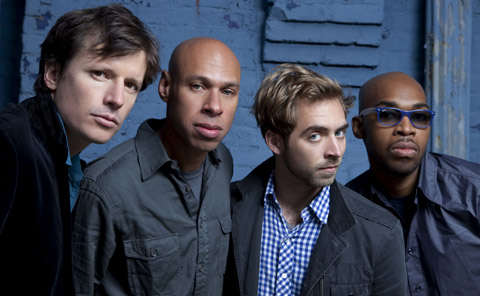
FORMAL WEAR James Farm — Penman, Redman, Parks, Harland — pay as much attention to the songs as to the solos. |
Like last weekend's folk festival, this weekend's Newport Jazz Festival offers a rich mix of styles and generations. And like the folk edition, this one also promises to stretch conceptions of the genre — from Eddie Palmieri's timeless salsa-jazz to Charles Lloyd's mystical latter-day Coltrane-ism to Ravi Coltrane himself; from Miguel Zenón's "Puerto Rican Songbook," to John Hollenbeck's cutting-edge Large Ensemble and Angelique Kidjo's Afropop.Typical of the festival's — and jazz's — rich crosscurrents these days is the collective quartet James Farm. This is a band with unassailable jazz bona fides. Saxophonist Joshua Redman, now 42, came out of Harvard a star and is one of a handful of jazz instrumentalists who can fill a venue like the Berklee Performance Center. Pianist Aaron Parks, 28, the youngest member of the band, has been a mainstay in Terence Blanchard's bands. And bassist Matt Penman, 36, and drummer Eric Harland, 34, have backed any number of heavyweights, including Redman.
But this album is typical of the latest wave of jazz 40-and-under in the way it subordinates its jazz chops to a pop-like attention to songs. Typically, a jazz band plays through a tune and then everyone takes turns soloing on the form. When a performance is long, it's usually because the solos are long or because there's a lot of them. But when a James Farm piece breaks the eight-minute mark — as a few of them do on their homonymous Nonesuch release — it's because the form itself has a lot of sections, and those sections morph and mutate. In Penman's "Coax," a tense, tolling piano figure unfolds into a portentous and muscular Redman tenor sax theme. But then the piece breaks into a free-roaming, rubato piano interlude laced with minor-keyed, dulcimer-like melodies. That piano solo is its own self-contained episode, though Parks's worrying repeated figures create further narrative expectancy — what's next? The answer comes with a return to the melody and some furious soloing from Redman.
A few of the album's other longish pieces build through episodic narratives. "I-10" is Harland's conjuring of the interstate that cuts through his hometown of Houston, and Parks's "Chronos" seems an extended meditation on time itself. Which isn't to say that there aren't simple jazz pleasures to be had on James Farm. Parks's "Bijou" is a folk waltz crying out for lyrics. And Redman's "Polliwog" is built on little ascending and descending riffs and gospel flourishes. And when he solos, with his repetitions of fast eighth note phrases, you can hear what's made him one of the more charismatic improvisers in jazz.
In the press material, Redman says that the album — and the band — has been a departure from the members' individual MOs, since they're not typically "material-based players." When I get him on the phone at his home in Berkeley, I ask him if this is specifically a reference to form.